Market Research: Raleigh Cyclelife Expansion in Latin America
VerifiedAdded on 2023/06/13
|9
|2444
|178
Report
AI Summary
This research report investigates the potential for Raleigh Cyclelife, a well-known bike brand, to expand its business operations into Latin America. It highlights the importance of conducting thorough market research to support effective managerial decision-making. The report includes an analysis of which countries in Latin America offer the greatest market potential for Raleigh Cyclelife's products, focusing on factors such as the increasing use of bicycles for transportation and exercise in countries like Brazil. The research objectives include reviewing the need for market research, determining the most promising Latin American countries for expansion, and recommending effective strategies for Raleigh Cyclelife's successful entry into the selected market. The report also delves into qualitative research methods, such as interviews and participant observation, discussing best practices and potential pitfalls. Ultimately, the report aims to provide actionable insights to guide Raleigh Cyclelife's strategic decision-making process.
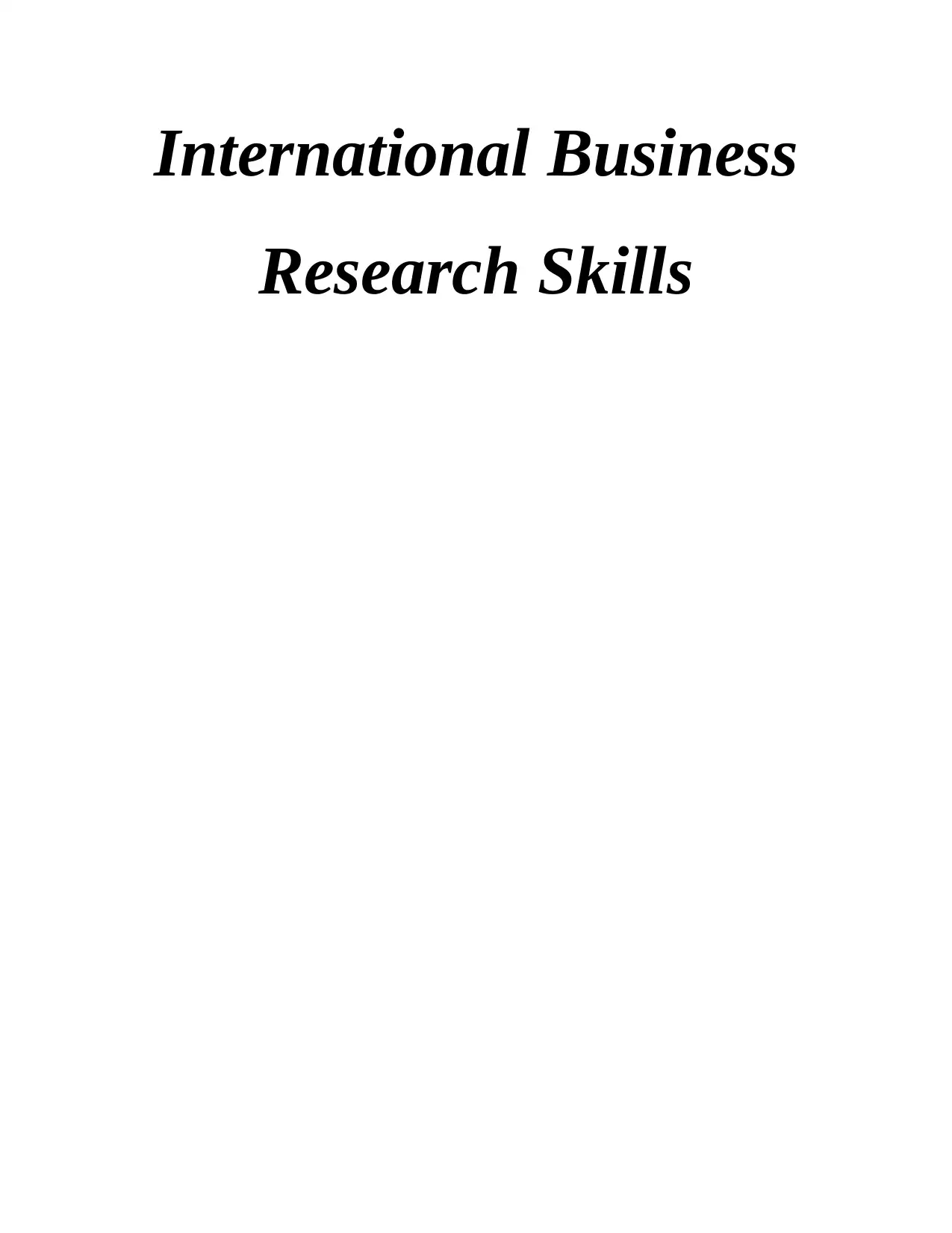
International Business
Research Skills
Research Skills
Paraphrase This Document
Need a fresh take? Get an instant paraphrase of this document with our AI Paraphraser

Table of Contents
INTRODUCTION...........................................................................................................................1
INTRODUCTION...........................................................................................................................1
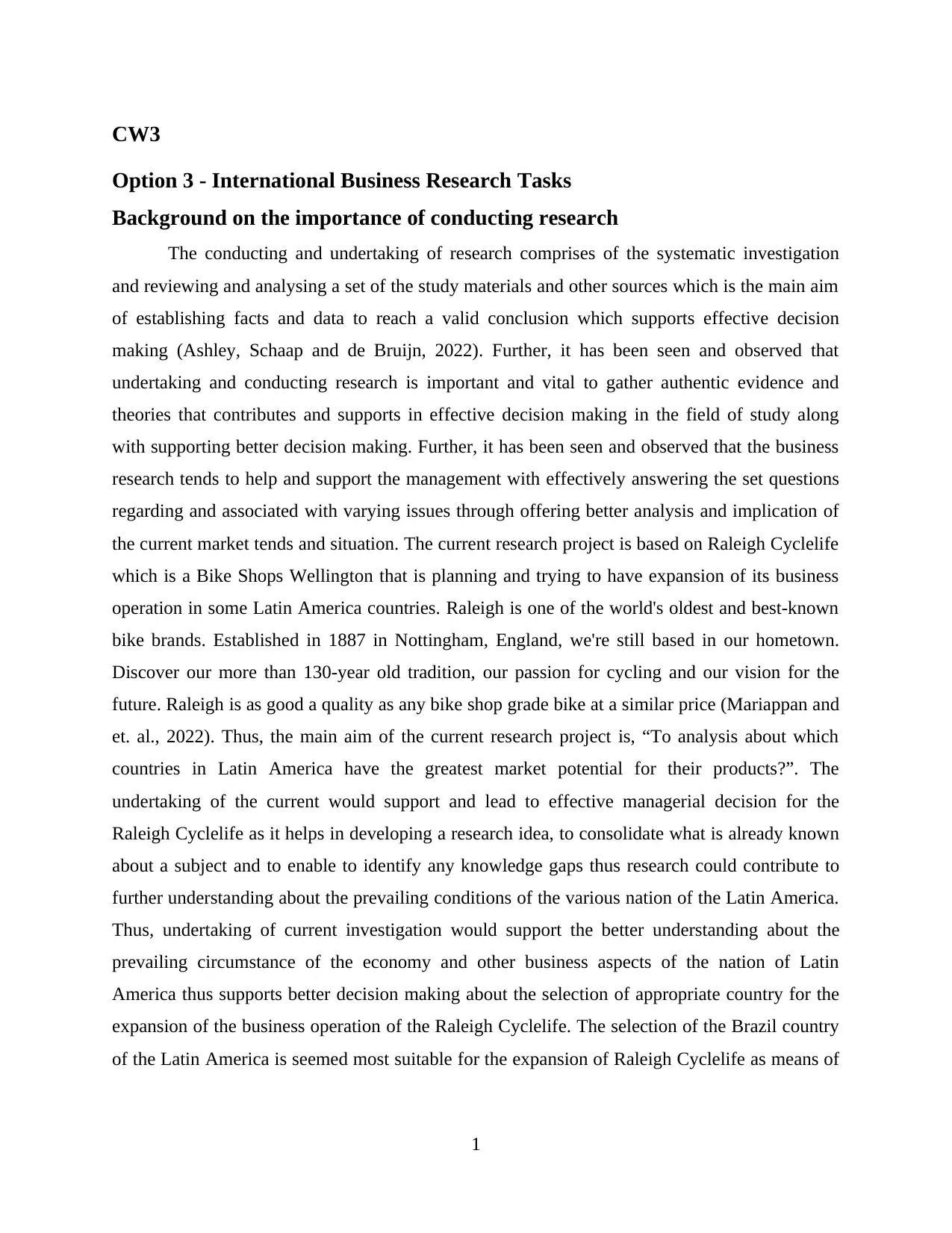
CW3
Option 3 - International Business Research Tasks
Background on the importance of conducting research
The conducting and undertaking of research comprises of the systematic investigation
and reviewing and analysing a set of the study materials and other sources which is the main aim
of establishing facts and data to reach a valid conclusion which supports effective decision
making (Ashley, Schaap and de Bruijn, 2022). Further, it has been seen and observed that
undertaking and conducting research is important and vital to gather authentic evidence and
theories that contributes and supports in effective decision making in the field of study along
with supporting better decision making. Further, it has been seen and observed that the business
research tends to help and support the management with effectively answering the set questions
regarding and associated with varying issues through offering better analysis and implication of
the current market tends and situation. The current research project is based on Raleigh Cyclelife
which is a Bike Shops Wellington that is planning and trying to have expansion of its business
operation in some Latin America countries. Raleigh is one of the world's oldest and best-known
bike brands. Established in 1887 in Nottingham, England, we're still based in our hometown.
Discover our more than 130-year old tradition, our passion for cycling and our vision for the
future. Raleigh is as good a quality as any bike shop grade bike at a similar price (Mariappan and
et. al., 2022). Thus, the main aim of the current research project is, “To analysis about which
countries in Latin America have the greatest market potential for their products?”. The
undertaking of the current would support and lead to effective managerial decision for the
Raleigh Cyclelife as it helps in developing a research idea, to consolidate what is already known
about a subject and to enable to identify any knowledge gaps thus research could contribute to
further understanding about the prevailing conditions of the various nation of the Latin America.
Thus, undertaking of current investigation would support the better understanding about the
prevailing circumstance of the economy and other business aspects of the nation of Latin
America thus supports better decision making about the selection of appropriate country for the
expansion of the business operation of the Raleigh Cyclelife. The selection of the Brazil country
of the Latin America is seemed most suitable for the expansion of Raleigh Cyclelife as means of
1
Option 3 - International Business Research Tasks
Background on the importance of conducting research
The conducting and undertaking of research comprises of the systematic investigation
and reviewing and analysing a set of the study materials and other sources which is the main aim
of establishing facts and data to reach a valid conclusion which supports effective decision
making (Ashley, Schaap and de Bruijn, 2022). Further, it has been seen and observed that
undertaking and conducting research is important and vital to gather authentic evidence and
theories that contributes and supports in effective decision making in the field of study along
with supporting better decision making. Further, it has been seen and observed that the business
research tends to help and support the management with effectively answering the set questions
regarding and associated with varying issues through offering better analysis and implication of
the current market tends and situation. The current research project is based on Raleigh Cyclelife
which is a Bike Shops Wellington that is planning and trying to have expansion of its business
operation in some Latin America countries. Raleigh is one of the world's oldest and best-known
bike brands. Established in 1887 in Nottingham, England, we're still based in our hometown.
Discover our more than 130-year old tradition, our passion for cycling and our vision for the
future. Raleigh is as good a quality as any bike shop grade bike at a similar price (Mariappan and
et. al., 2022). Thus, the main aim of the current research project is, “To analysis about which
countries in Latin America have the greatest market potential for their products?”. The
undertaking of the current would support and lead to effective managerial decision for the
Raleigh Cyclelife as it helps in developing a research idea, to consolidate what is already known
about a subject and to enable to identify any knowledge gaps thus research could contribute to
further understanding about the prevailing conditions of the various nation of the Latin America.
Thus, undertaking of current investigation would support the better understanding about the
prevailing circumstance of the economy and other business aspects of the nation of Latin
America thus supports better decision making about the selection of appropriate country for the
expansion of the business operation of the Raleigh Cyclelife. The selection of the Brazil country
of the Latin America is seemed most suitable for the expansion of Raleigh Cyclelife as means of
1
⊘ This is a preview!⊘
Do you want full access?
Subscribe today to unlock all pages.

Trusted by 1+ million students worldwide
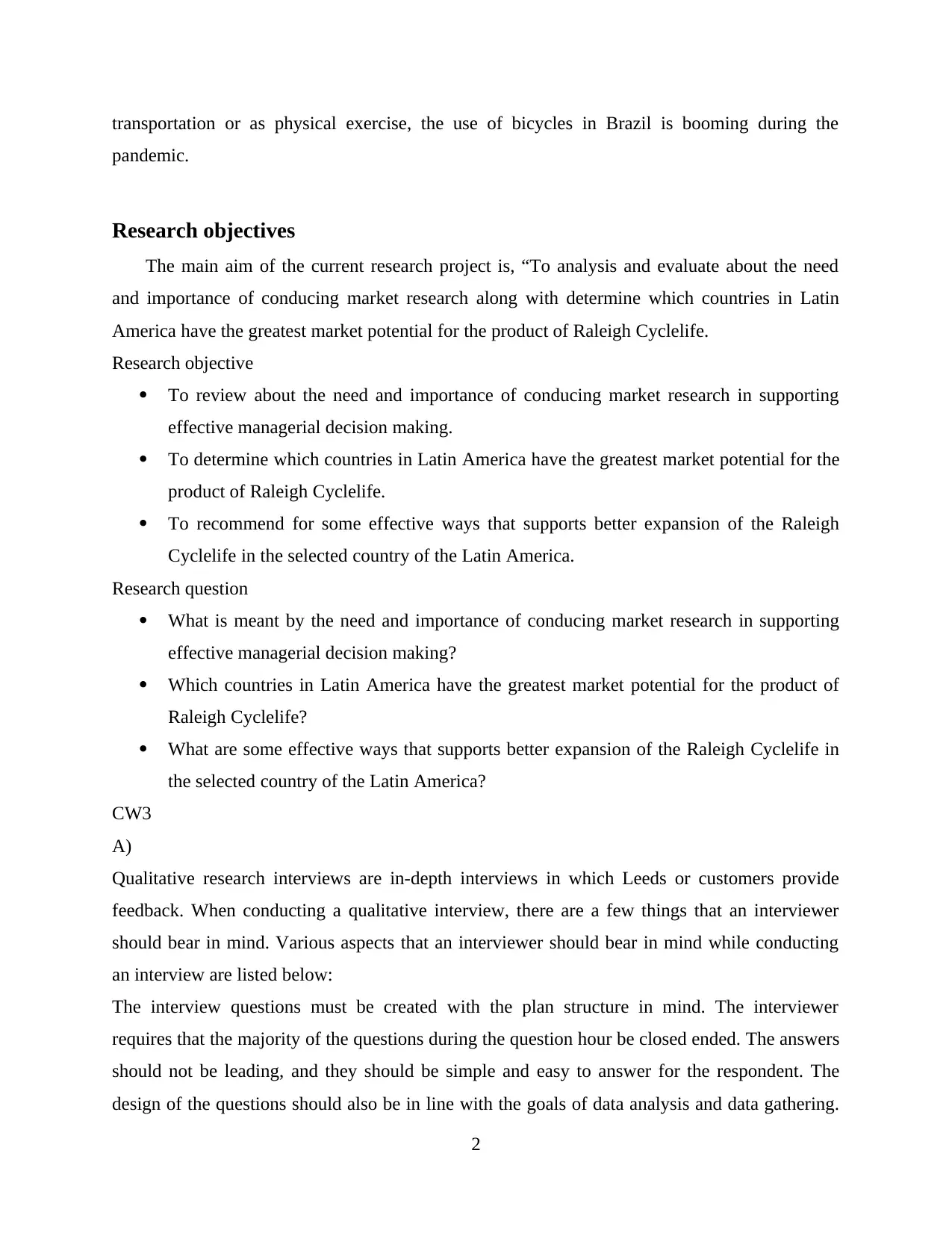
transportation or as physical exercise, the use of bicycles in Brazil is booming during the
pandemic.
Research objectives
The main aim of the current research project is, “To analysis and evaluate about the need
and importance of conducing market research along with determine which countries in Latin
America have the greatest market potential for the product of Raleigh Cyclelife.
Research objective
To review about the need and importance of conducing market research in supporting
effective managerial decision making.
To determine which countries in Latin America have the greatest market potential for the
product of Raleigh Cyclelife.
To recommend for some effective ways that supports better expansion of the Raleigh
Cyclelife in the selected country of the Latin America.
Research question
What is meant by the need and importance of conducing market research in supporting
effective managerial decision making?
Which countries in Latin America have the greatest market potential for the product of
Raleigh Cyclelife?
What are some effective ways that supports better expansion of the Raleigh Cyclelife in
the selected country of the Latin America?
CW3
A)
Qualitative research interviews are in-depth interviews in which Leeds or customers provide
feedback. When conducting a qualitative interview, there are a few things that an interviewer
should bear in mind. Various aspects that an interviewer should bear in mind while conducting
an interview are listed below:
The interview questions must be created with the plan structure in mind. The interviewer
requires that the majority of the questions during the question hour be closed ended. The answers
should not be leading, and they should be simple and easy to answer for the respondent. The
design of the questions should also be in line with the goals of data analysis and data gathering.
2
pandemic.
Research objectives
The main aim of the current research project is, “To analysis and evaluate about the need
and importance of conducing market research along with determine which countries in Latin
America have the greatest market potential for the product of Raleigh Cyclelife.
Research objective
To review about the need and importance of conducing market research in supporting
effective managerial decision making.
To determine which countries in Latin America have the greatest market potential for the
product of Raleigh Cyclelife.
To recommend for some effective ways that supports better expansion of the Raleigh
Cyclelife in the selected country of the Latin America.
Research question
What is meant by the need and importance of conducing market research in supporting
effective managerial decision making?
Which countries in Latin America have the greatest market potential for the product of
Raleigh Cyclelife?
What are some effective ways that supports better expansion of the Raleigh Cyclelife in
the selected country of the Latin America?
CW3
A)
Qualitative research interviews are in-depth interviews in which Leeds or customers provide
feedback. When conducting a qualitative interview, there are a few things that an interviewer
should bear in mind. Various aspects that an interviewer should bear in mind while conducting
an interview are listed below:
The interview questions must be created with the plan structure in mind. The interviewer
requires that the majority of the questions during the question hour be closed ended. The answers
should not be leading, and they should be simple and easy to answer for the respondent. The
design of the questions should also be in line with the goals of data analysis and data gathering.
2
Paraphrase This Document
Need a fresh take? Get an instant paraphrase of this document with our AI Paraphraser
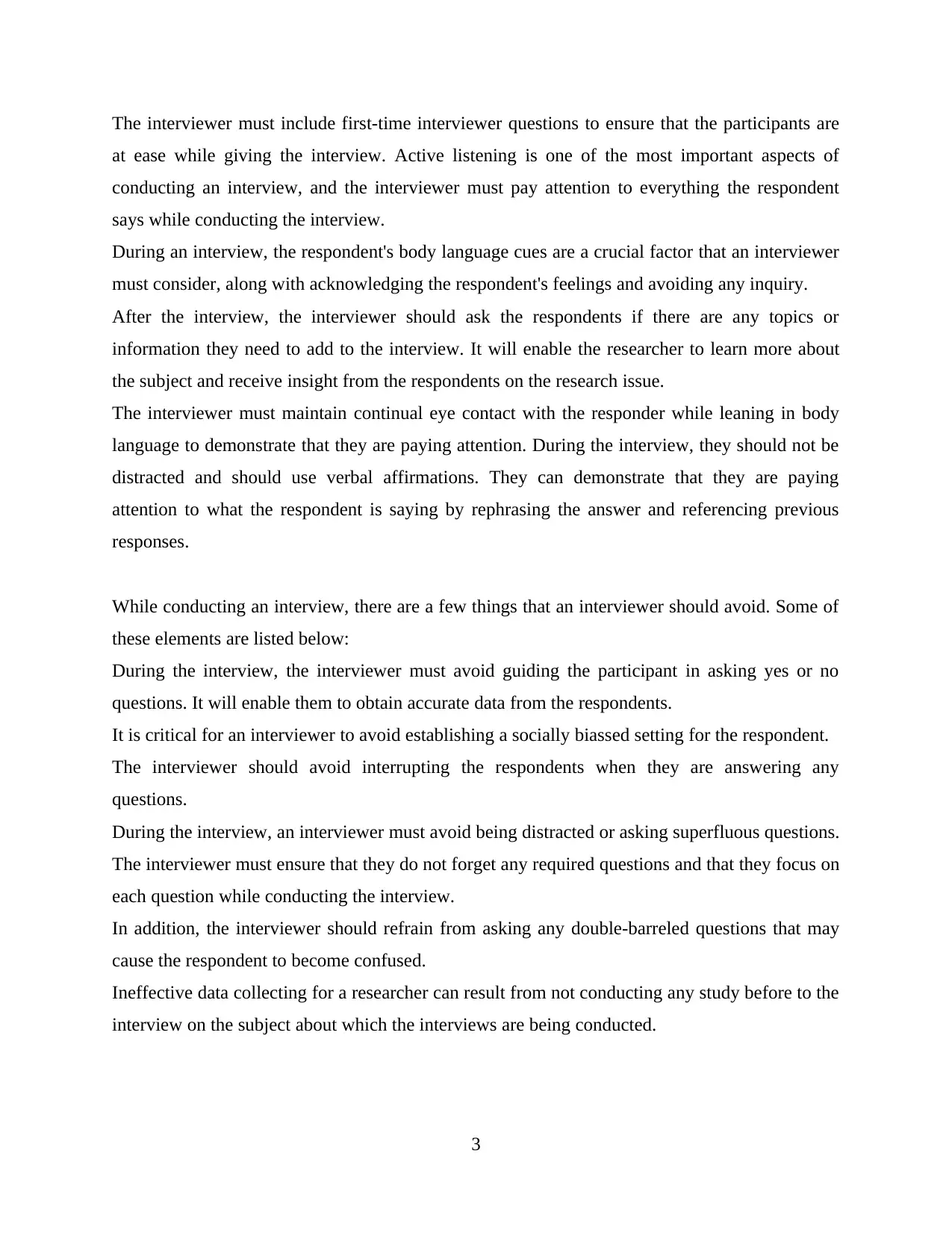
The interviewer must include first-time interviewer questions to ensure that the participants are
at ease while giving the interview. Active listening is one of the most important aspects of
conducting an interview, and the interviewer must pay attention to everything the respondent
says while conducting the interview.
During an interview, the respondent's body language cues are a crucial factor that an interviewer
must consider, along with acknowledging the respondent's feelings and avoiding any inquiry.
After the interview, the interviewer should ask the respondents if there are any topics or
information they need to add to the interview. It will enable the researcher to learn more about
the subject and receive insight from the respondents on the research issue.
The interviewer must maintain continual eye contact with the responder while leaning in body
language to demonstrate that they are paying attention. During the interview, they should not be
distracted and should use verbal affirmations. They can demonstrate that they are paying
attention to what the respondent is saying by rephrasing the answer and referencing previous
responses.
While conducting an interview, there are a few things that an interviewer should avoid. Some of
these elements are listed below:
During the interview, the interviewer must avoid guiding the participant in asking yes or no
questions. It will enable them to obtain accurate data from the respondents.
It is critical for an interviewer to avoid establishing a socially biassed setting for the respondent.
The interviewer should avoid interrupting the respondents when they are answering any
questions.
During the interview, an interviewer must avoid being distracted or asking superfluous questions.
The interviewer must ensure that they do not forget any required questions and that they focus on
each question while conducting the interview.
In addition, the interviewer should refrain from asking any double-barreled questions that may
cause the respondent to become confused.
Ineffective data collecting for a researcher can result from not conducting any study before to the
interview on the subject about which the interviews are being conducted.
3
at ease while giving the interview. Active listening is one of the most important aspects of
conducting an interview, and the interviewer must pay attention to everything the respondent
says while conducting the interview.
During an interview, the respondent's body language cues are a crucial factor that an interviewer
must consider, along with acknowledging the respondent's feelings and avoiding any inquiry.
After the interview, the interviewer should ask the respondents if there are any topics or
information they need to add to the interview. It will enable the researcher to learn more about
the subject and receive insight from the respondents on the research issue.
The interviewer must maintain continual eye contact with the responder while leaning in body
language to demonstrate that they are paying attention. During the interview, they should not be
distracted and should use verbal affirmations. They can demonstrate that they are paying
attention to what the respondent is saying by rephrasing the answer and referencing previous
responses.
While conducting an interview, there are a few things that an interviewer should avoid. Some of
these elements are listed below:
During the interview, the interviewer must avoid guiding the participant in asking yes or no
questions. It will enable them to obtain accurate data from the respondents.
It is critical for an interviewer to avoid establishing a socially biassed setting for the respondent.
The interviewer should avoid interrupting the respondents when they are answering any
questions.
During the interview, an interviewer must avoid being distracted or asking superfluous questions.
The interviewer must ensure that they do not forget any required questions and that they focus on
each question while conducting the interview.
In addition, the interviewer should refrain from asking any double-barreled questions that may
cause the respondent to become confused.
Ineffective data collecting for a researcher can result from not conducting any study before to the
interview on the subject about which the interviews are being conducted.
3
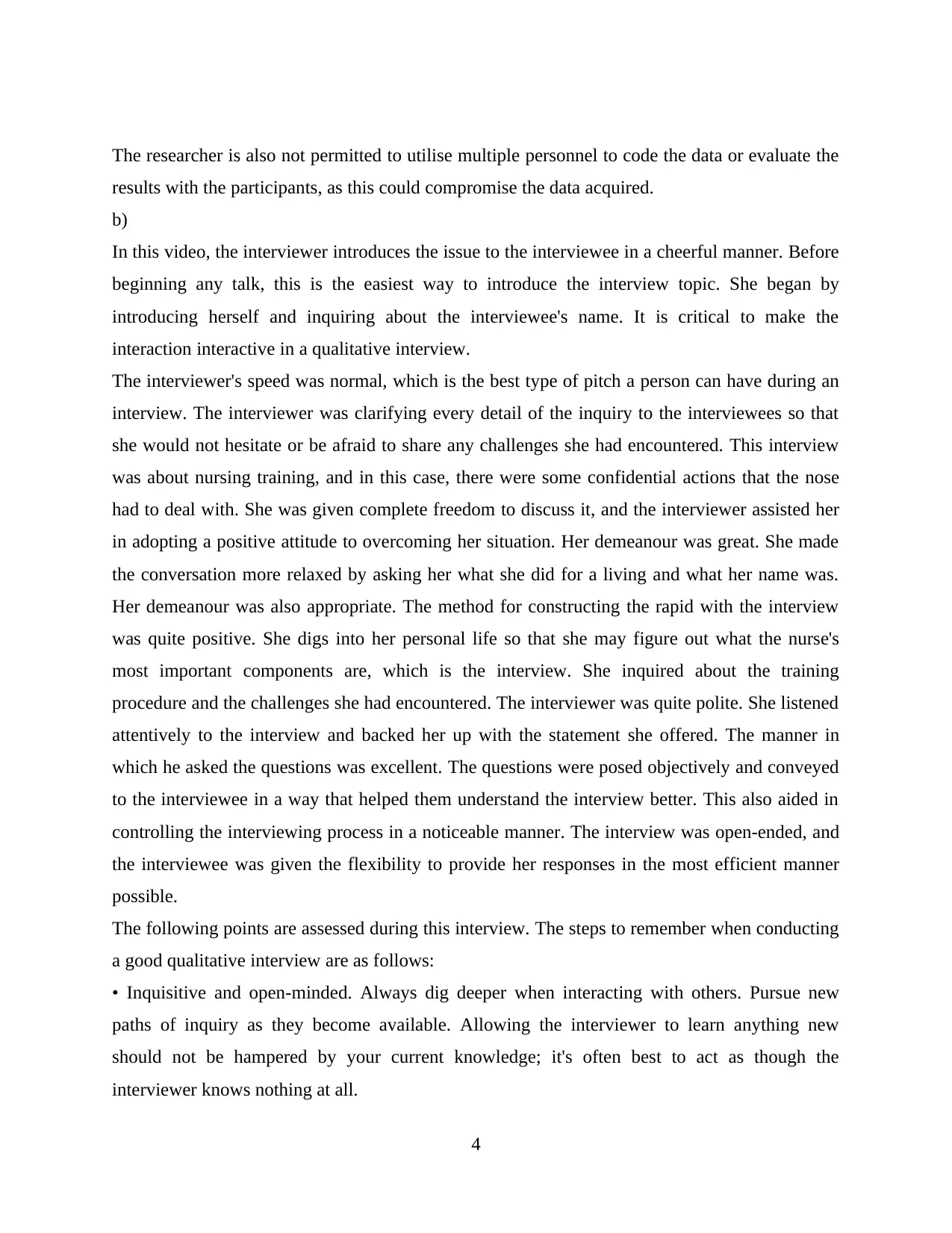
The researcher is also not permitted to utilise multiple personnel to code the data or evaluate the
results with the participants, as this could compromise the data acquired.
b)
In this video, the interviewer introduces the issue to the interviewee in a cheerful manner. Before
beginning any talk, this is the easiest way to introduce the interview topic. She began by
introducing herself and inquiring about the interviewee's name. It is critical to make the
interaction interactive in a qualitative interview.
The interviewer's speed was normal, which is the best type of pitch a person can have during an
interview. The interviewer was clarifying every detail of the inquiry to the interviewees so that
she would not hesitate or be afraid to share any challenges she had encountered. This interview
was about nursing training, and in this case, there were some confidential actions that the nose
had to deal with. She was given complete freedom to discuss it, and the interviewer assisted her
in adopting a positive attitude to overcoming her situation. Her demeanour was great. She made
the conversation more relaxed by asking her what she did for a living and what her name was.
Her demeanour was also appropriate. The method for constructing the rapid with the interview
was quite positive. She digs into her personal life so that she may figure out what the nurse's
most important components are, which is the interview. She inquired about the training
procedure and the challenges she had encountered. The interviewer was quite polite. She listened
attentively to the interview and backed her up with the statement she offered. The manner in
which he asked the questions was excellent. The questions were posed objectively and conveyed
to the interviewee in a way that helped them understand the interview better. This also aided in
controlling the interviewing process in a noticeable manner. The interview was open-ended, and
the interviewee was given the flexibility to provide her responses in the most efficient manner
possible.
The following points are assessed during this interview. The steps to remember when conducting
a good qualitative interview are as follows:
• Inquisitive and open-minded. Always dig deeper when interacting with others. Pursue new
paths of inquiry as they become available. Allowing the interviewer to learn anything new
should not be hampered by your current knowledge; it's often best to act as though the
interviewer knows nothing at all.
4
results with the participants, as this could compromise the data acquired.
b)
In this video, the interviewer introduces the issue to the interviewee in a cheerful manner. Before
beginning any talk, this is the easiest way to introduce the interview topic. She began by
introducing herself and inquiring about the interviewee's name. It is critical to make the
interaction interactive in a qualitative interview.
The interviewer's speed was normal, which is the best type of pitch a person can have during an
interview. The interviewer was clarifying every detail of the inquiry to the interviewees so that
she would not hesitate or be afraid to share any challenges she had encountered. This interview
was about nursing training, and in this case, there were some confidential actions that the nose
had to deal with. She was given complete freedom to discuss it, and the interviewer assisted her
in adopting a positive attitude to overcoming her situation. Her demeanour was great. She made
the conversation more relaxed by asking her what she did for a living and what her name was.
Her demeanour was also appropriate. The method for constructing the rapid with the interview
was quite positive. She digs into her personal life so that she may figure out what the nurse's
most important components are, which is the interview. She inquired about the training
procedure and the challenges she had encountered. The interviewer was quite polite. She listened
attentively to the interview and backed her up with the statement she offered. The manner in
which he asked the questions was excellent. The questions were posed objectively and conveyed
to the interviewee in a way that helped them understand the interview better. This also aided in
controlling the interviewing process in a noticeable manner. The interview was open-ended, and
the interviewee was given the flexibility to provide her responses in the most efficient manner
possible.
The following points are assessed during this interview. The steps to remember when conducting
a good qualitative interview are as follows:
• Inquisitive and open-minded. Always dig deeper when interacting with others. Pursue new
paths of inquiry as they become available. Allowing the interviewer to learn anything new
should not be hampered by your current knowledge; it's often best to act as though the
interviewer knows nothing at all.
4
⊘ This is a preview!⊘
Do you want full access?
Subscribe today to unlock all pages.

Trusted by 1+ million students worldwide
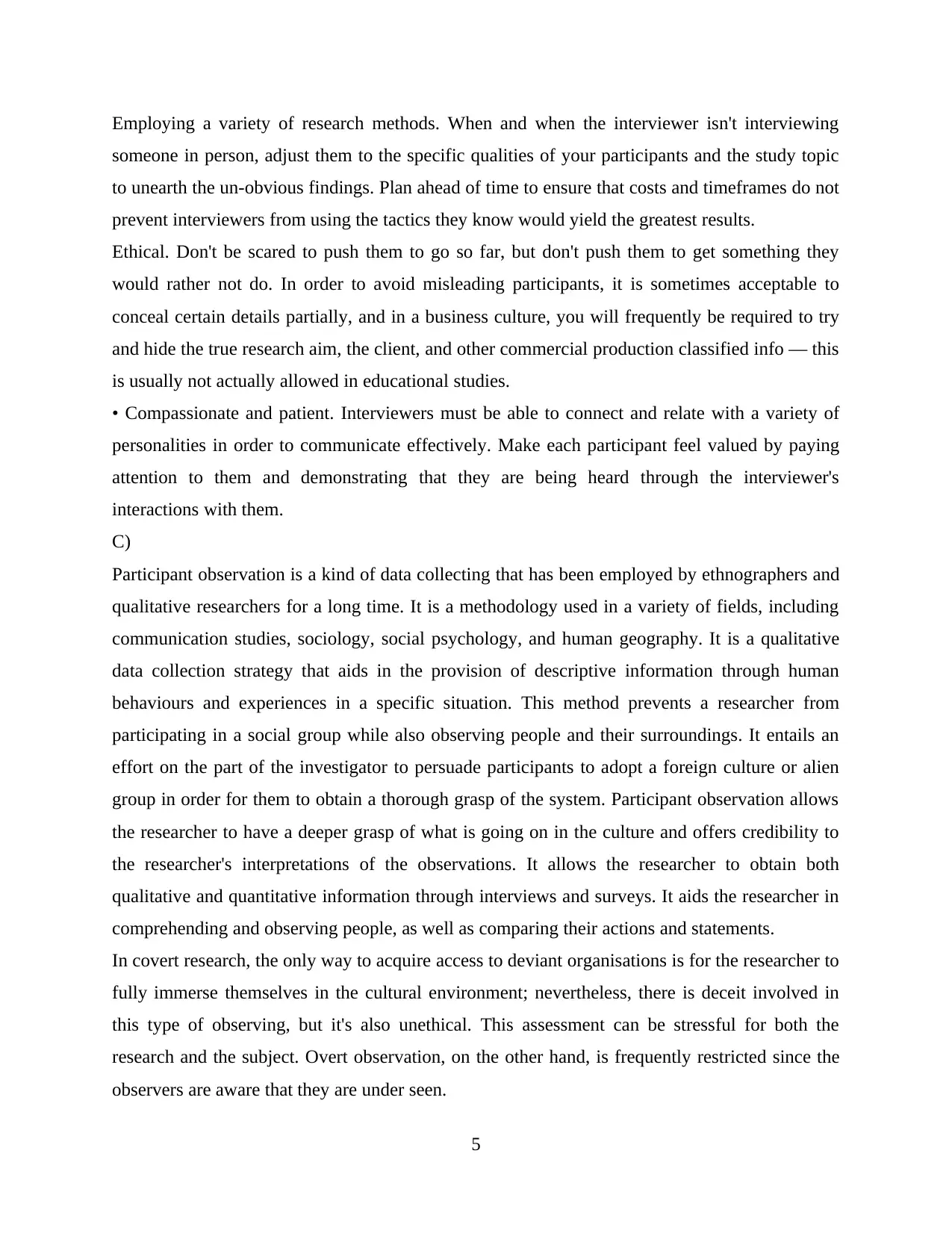
Employing a variety of research methods. When and when the interviewer isn't interviewing
someone in person, adjust them to the specific qualities of your participants and the study topic
to unearth the un-obvious findings. Plan ahead of time to ensure that costs and timeframes do not
prevent interviewers from using the tactics they know would yield the greatest results.
Ethical. Don't be scared to push them to go so far, but don't push them to get something they
would rather not do. In order to avoid misleading participants, it is sometimes acceptable to
conceal certain details partially, and in a business culture, you will frequently be required to try
and hide the true research aim, the client, and other commercial production classified info — this
is usually not actually allowed in educational studies.
• Compassionate and patient. Interviewers must be able to connect and relate with a variety of
personalities in order to communicate effectively. Make each participant feel valued by paying
attention to them and demonstrating that they are being heard through the interviewer's
interactions with them.
C)
Participant observation is a kind of data collecting that has been employed by ethnographers and
qualitative researchers for a long time. It is a methodology used in a variety of fields, including
communication studies, sociology, social psychology, and human geography. It is a qualitative
data collection strategy that aids in the provision of descriptive information through human
behaviours and experiences in a specific situation. This method prevents a researcher from
participating in a social group while also observing people and their surroundings. It entails an
effort on the part of the investigator to persuade participants to adopt a foreign culture or alien
group in order for them to obtain a thorough grasp of the system. Participant observation allows
the researcher to have a deeper grasp of what is going on in the culture and offers credibility to
the researcher's interpretations of the observations. It allows the researcher to obtain both
qualitative and quantitative information through interviews and surveys. It aids the researcher in
comprehending and observing people, as well as comparing their actions and statements.
In covert research, the only way to acquire access to deviant organisations is for the researcher to
fully immerse themselves in the cultural environment; nevertheless, there is deceit involved in
this type of observing, but it's also unethical. This assessment can be stressful for both the
research and the subject. Overt observation, on the other hand, is frequently restricted since the
observers are aware that they are under seen.
5
someone in person, adjust them to the specific qualities of your participants and the study topic
to unearth the un-obvious findings. Plan ahead of time to ensure that costs and timeframes do not
prevent interviewers from using the tactics they know would yield the greatest results.
Ethical. Don't be scared to push them to go so far, but don't push them to get something they
would rather not do. In order to avoid misleading participants, it is sometimes acceptable to
conceal certain details partially, and in a business culture, you will frequently be required to try
and hide the true research aim, the client, and other commercial production classified info — this
is usually not actually allowed in educational studies.
• Compassionate and patient. Interviewers must be able to connect and relate with a variety of
personalities in order to communicate effectively. Make each participant feel valued by paying
attention to them and demonstrating that they are being heard through the interviewer's
interactions with them.
C)
Participant observation is a kind of data collecting that has been employed by ethnographers and
qualitative researchers for a long time. It is a methodology used in a variety of fields, including
communication studies, sociology, social psychology, and human geography. It is a qualitative
data collection strategy that aids in the provision of descriptive information through human
behaviours and experiences in a specific situation. This method prevents a researcher from
participating in a social group while also observing people and their surroundings. It entails an
effort on the part of the investigator to persuade participants to adopt a foreign culture or alien
group in order for them to obtain a thorough grasp of the system. Participant observation allows
the researcher to have a deeper grasp of what is going on in the culture and offers credibility to
the researcher's interpretations of the observations. It allows the researcher to obtain both
qualitative and quantitative information through interviews and surveys. It aids the researcher in
comprehending and observing people, as well as comparing their actions and statements.
In covert research, the only way to acquire access to deviant organisations is for the researcher to
fully immerse themselves in the cultural environment; nevertheless, there is deceit involved in
this type of observing, but it's also unethical. This assessment can be stressful for both the
research and the subject. Overt observation, on the other hand, is frequently restricted since the
observers are aware that they are under seen.
5
Paraphrase This Document
Need a fresh take? Get an instant paraphrase of this document with our AI Paraphraser
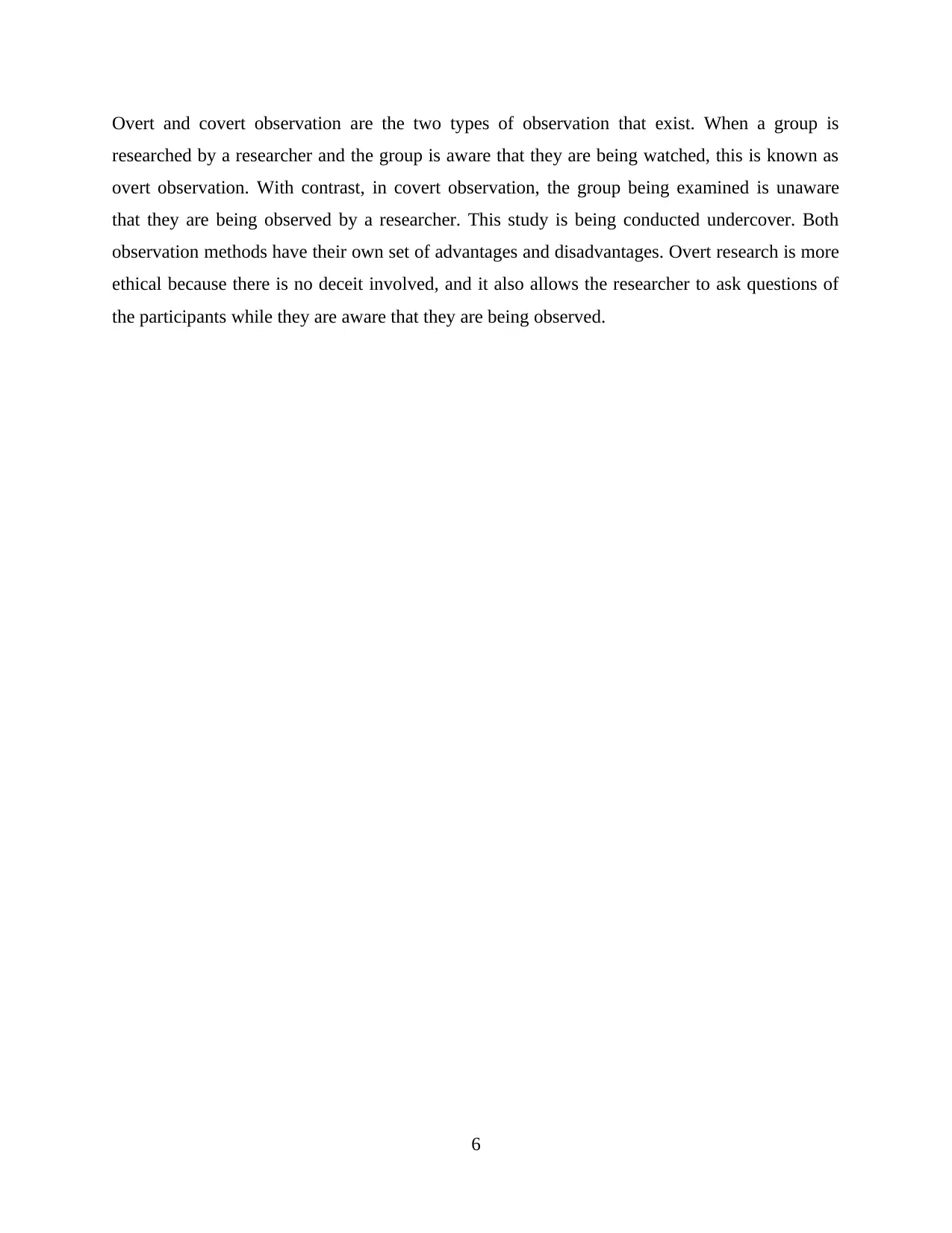
Overt and covert observation are the two types of observation that exist. When a group is
researched by a researcher and the group is aware that they are being watched, this is known as
overt observation. With contrast, in covert observation, the group being examined is unaware
that they are being observed by a researcher. This study is being conducted undercover. Both
observation methods have their own set of advantages and disadvantages. Overt research is more
ethical because there is no deceit involved, and it also allows the researcher to ask questions of
the participants while they are aware that they are being observed.
6
researched by a researcher and the group is aware that they are being watched, this is known as
overt observation. With contrast, in covert observation, the group being examined is unaware
that they are being observed by a researcher. This study is being conducted undercover. Both
observation methods have their own set of advantages and disadvantages. Overt research is more
ethical because there is no deceit involved, and it also allows the researcher to ask questions of
the participants while they are aware that they are being observed.
6
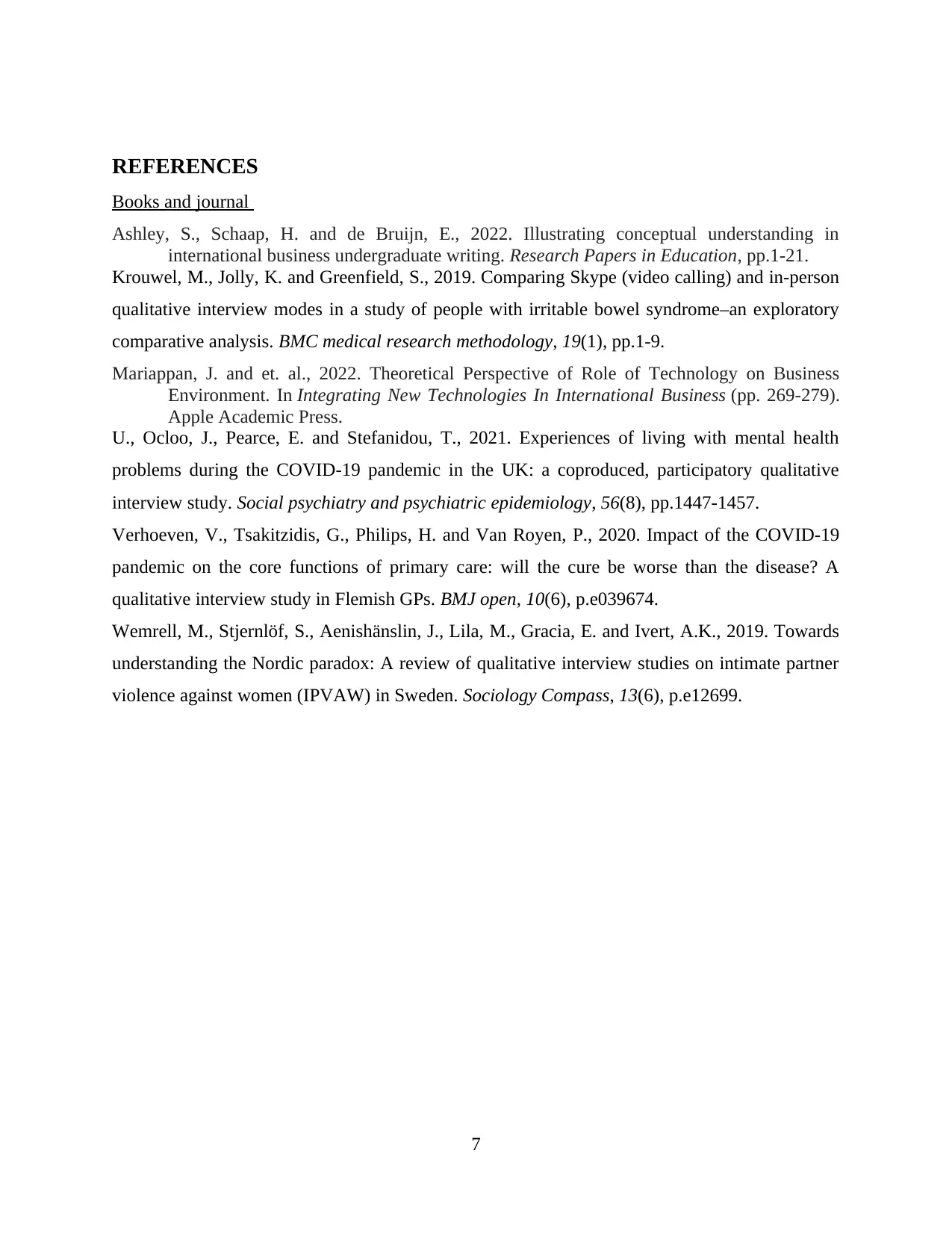
REFERENCES
Books and journal
Ashley, S., Schaap, H. and de Bruijn, E., 2022. Illustrating conceptual understanding in
international business undergraduate writing. Research Papers in Education, pp.1-21.
Krouwel, M., Jolly, K. and Greenfield, S., 2019. Comparing Skype (video calling) and in-person
qualitative interview modes in a study of people with irritable bowel syndrome–an exploratory
comparative analysis. BMC medical research methodology, 19(1), pp.1-9.
Mariappan, J. and et. al., 2022. Theoretical Perspective of Role of Technology on Business
Environment. In Integrating New Technologies In International Business (pp. 269-279).
Apple Academic Press.
U., Ocloo, J., Pearce, E. and Stefanidou, T., 2021. Experiences of living with mental health
problems during the COVID-19 pandemic in the UK: a coproduced, participatory qualitative
interview study. Social psychiatry and psychiatric epidemiology, 56(8), pp.1447-1457.
Verhoeven, V., Tsakitzidis, G., Philips, H. and Van Royen, P., 2020. Impact of the COVID-19
pandemic on the core functions of primary care: will the cure be worse than the disease? A
qualitative interview study in Flemish GPs. BMJ open, 10(6), p.e039674.
Wemrell, M., Stjernlöf, S., Aenishänslin, J., Lila, M., Gracia, E. and Ivert, A.K., 2019. Towards
understanding the Nordic paradox: A review of qualitative interview studies on intimate partner
violence against women (IPVAW) in Sweden. Sociology Compass, 13(6), p.e12699.
7
Books and journal
Ashley, S., Schaap, H. and de Bruijn, E., 2022. Illustrating conceptual understanding in
international business undergraduate writing. Research Papers in Education, pp.1-21.
Krouwel, M., Jolly, K. and Greenfield, S., 2019. Comparing Skype (video calling) and in-person
qualitative interview modes in a study of people with irritable bowel syndrome–an exploratory
comparative analysis. BMC medical research methodology, 19(1), pp.1-9.
Mariappan, J. and et. al., 2022. Theoretical Perspective of Role of Technology on Business
Environment. In Integrating New Technologies In International Business (pp. 269-279).
Apple Academic Press.
U., Ocloo, J., Pearce, E. and Stefanidou, T., 2021. Experiences of living with mental health
problems during the COVID-19 pandemic in the UK: a coproduced, participatory qualitative
interview study. Social psychiatry and psychiatric epidemiology, 56(8), pp.1447-1457.
Verhoeven, V., Tsakitzidis, G., Philips, H. and Van Royen, P., 2020. Impact of the COVID-19
pandemic on the core functions of primary care: will the cure be worse than the disease? A
qualitative interview study in Flemish GPs. BMJ open, 10(6), p.e039674.
Wemrell, M., Stjernlöf, S., Aenishänslin, J., Lila, M., Gracia, E. and Ivert, A.K., 2019. Towards
understanding the Nordic paradox: A review of qualitative interview studies on intimate partner
violence against women (IPVAW) in Sweden. Sociology Compass, 13(6), p.e12699.
7
⊘ This is a preview!⊘
Do you want full access?
Subscribe today to unlock all pages.

Trusted by 1+ million students worldwide
1 out of 9
Related Documents
Your All-in-One AI-Powered Toolkit for Academic Success.
+13062052269
info@desklib.com
Available 24*7 on WhatsApp / Email
![[object Object]](/_next/static/media/star-bottom.7253800d.svg)
Unlock your academic potential
Copyright © 2020–2025 A2Z Services. All Rights Reserved. Developed and managed by ZUCOL.





